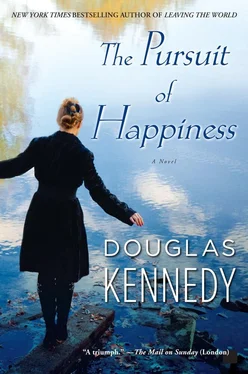Yes, I was being hard, steely. But the hardness was necessary - a means by which to cope with the all-permeating sense of loss. Initially it gave me a modus vivendi to get me through days which often seemed bottomless. But now there was the astonishing prospect of a baby. And though that prospect wouldn't soften my stance towards Jack, I knew it would give me a sense of possibility; a destination at the end of all this anguish.
I kept my appointment with Dr Bolduck seven days later. He was as genial as ever.
'I'm afraid the delightful Dr Grayson was right: pregnancy tests rarely lie. You are definitely going to have a baby'.
I smiled.
'Well, at least you seem pleased with the news', he said.
'Believe me, I am. And flabbergasted'.
'That's understandable. Especially as I've just been reading your file from Greenwich Hospital... which only arrived yesterday. The doctor attending you was, in my opinion, wrong to inform you that your damaged womb ruled out all possibilities of carrying a child to term. Yes, one of your fallopian tubes was badly damaged, which does significantly lessen the potential for conception. And yes, the internal injury that the wall of your womb suffered also decreases the possibility of a pregnancy. But it doesn't rule it out altogether. I personally know of several cases where conception happened after this sort of medical event, and the pregnancy was carried to full term. Which, in plain language, means that your doctor at Greenwich Hospital may have just been a tad pessimistic about your chances of having a baby. Personally, I think what he did was shameful, because it caused you years of unnecessary distress. But don't quote me on that. Part of the Hippocratic oath has a clause saying you can never censure another doctor... especially in front of one of his patients'.
'Don't worry - I'll censure him myself. He was an awful man. So awful he made Dr Grayson look like Albert Schweitzer'.
Now it was Dr Bolduck's turn to laugh. 'I might use that', he said.
'Be my guest'.
His smile changed into a look of professional seriousness. 'Though this is wonderful news, I really am going to want you to take it easy. Very easy. Because of the previous internal damage, this will be a delicate, finely balanced pregnancy'.
'Is there a chance that I might lose it?'
'There is always a one-in-six chance of miscarrying in the first three months of term'.
'But with my previous history... ?'
'The odds might be as low as one-in-three... but they're still in your favor. You will simply have to be as careful as possible. As long as you don't go climbing Mount Kathadin or decide to play ice hockey for Bowdoin, you should have a good shot at holding on to it. I'm afraid luck also has a lot to do with these things too. Are you planning to stay around here?'
I had nowhere else to go. And since rest and lack of anxiety were going to be crucial over the next eight months, there was no way I would be returning to Manhattan.
'Yes, I'm staying in Maine'.
'Again, this is none of my business... but do you really think it's a good idea being alone in an isolated place like Popham Beach?'
I had to admit that it wasn't. So - as much as I rued the loss of that extraordinary sweep of sand, sky and ocean - I moved a week later into Brunswick. After scanning the Classifieds in the Maine Gazette for a few days, I managed to find a pleasant, if somewhat rustic apartment on Federal Street. It was a one-bedroom unit in an unprepossessing white clapboard house. The decor could have been politely described as 'tired': yellowing walls, cast-off furniture, a basic kitchen, a brass bed in urgent need of a polish. But the morning light flooded the living room. There was a large mahogany roll-top desk and a wonderful old-style editor's chair (the desk and chair were actually what sold me on the place). And it was close to the college, the town, and the offices of Dr Bolduck - so I could walk everywhere.
Ruth helped me move. I set up an account with the Casco National Bank on Maine Street, and (via Joel Eberts) arranged to have my weekly Saturday Night/Sunday Morning checks dispatched there. I had another four months to go on my alleged 'leave of absence'. The weekly retainer easily covered my eighteen-dollar weekly rent and all basic necessities. It even left me enough over to buy a radio, a Victrola, and a steady supply of books and records. I also started reading newspapers again: the local Maine Gazette and the Boston Globe (as it took three days for the New York Times to reach Brunswick). Joe McCarthy and his band of cronies were in full demagogic flight. The Rosenbergs were entering the final appeal process against their death sentence for allegedly smuggling atomic bomb secrets to the Soviets. Eisenhower was looking a dead cert to beat Adlai Stevenson for the presidency in the coming November election. And the blacklist seemed to get longer with every new Associated Press wire report from Washington. On a minor personal level, I knew that this ever-deepening Red scare meant that there was no way I'd be welcomed back to Saturday/Sunday after my residency in purdah was over. Eric's death had been all over the papers - and his Godship the Editor would be far too nervous about upsetting the board by reinstating me. After all, I was the sister of a deceased man who had the unpatriotic nerve not to rat on others. Surely that made me damaged, unAmerican goods... and unworthy of access to the precious column inches of Saturday Night/Sunday Morning.
So I figured that, halfway through my pregnancy, the guilt money from Saturday/Sunday would run out, after which I would have to start tapping into the insurance cash from NBC or my stock portfolio... though a certain corner of my frugal puritan brain fretted about the idea of raiding my capital at such a young age. Especially as I would definitely need that money to help bring this child up on my own. I also worried about the fact that - thanks to the Winchell piece and my reluctant furlough from Saturday/Sunday - the word around town was that I was politically suspect and best left unemployed.
But every time I started to have one of these nervy reveries about my future employment prospects (or lack thereof), I managed to calm myself down with the thought that, one way or another, I'd find a way of making a living. More tellingly, I was luckier than most. I had money in the bank and an apartment in Manhattan which I owned outright. They might take my career away from me... but they couldn't snatch the roof over my head.
Anyway, there was no chance I'd be back in Manhattan for some time. Just as there was also no chance that I'd be telling anyone about my pregnancy. Ruth was the only person who knew - and she promised to keep quiet on the subject.
'Trust me', she said, 'I know how small towns work. The moment word gets out is the moment you'll start getting interested stares on the street'.
'But won't I begin to get those stares once I start to show?'
'It really depends how high a profile you choose to adopt; how many people you get to know, and what you tell them. I promise you - if you let it be known that you're the Sara Smythe who writes for Saturday Night/Sunday Morning, your social diary is going to get very full. Half the English department at Bowdoin will probably want to meet you - because new people in town are few and far between. And new people who are nationally prominent columnists
'I'm hardly Walter Lippmann, Ruth. I'm a very minor figure who writes very minor stuff'.
'Listen to Miss Modesty'.
'It's the truth. And, believe me, I'm telling no one about what I did in Manhattan. I've had enough intrusiveness - courtesy of the FBI - to last me for the rest of the decade'.
So I maintained a very low profile. Following Dr Bolduck's advice, I did nothing strenuous - limiting my exercise to walks in the Bowdoin Pines behind the campus, or to the college's library (where I managed to wangle a Brunswick resident's reader's ticket), and to the shops that lined Maine Street. I found a grocer who delivered, and a newspaper shop which agreed to order the Sunday edition of the New York Times for me. I became a good customer of the town's main book and record shop. I was soon on first-name basis with the librarians at Bowdoin, Mr Cole at the grocer's, Thelma the chief cashier at Casco National Bank, and Mr Mullin, the druggist. Though everyone initially asked me my name - and whether I was new in town - the line of enquiry stopped there. There were never sly questions about what I was doing in Brunswick, or whether I had a husband, or how I was supporting myself. As I came to discover, this lack of obtrusive curiosity was the Maine way. People respected your privacy... because they wanted you to respect theirs. More tellingly, in true Maine style, the state's unspoken social code was a fiercely independent one: your business is your own damn business, not mine. Even if they were interested in your back story, they forced themselves to appear disinterested... out of fear of being labeled meddlesome, or the village gossip. Maine was probably one of the few places in America where taciturnity and reserve were considered civic virtues.
Читать дальше












